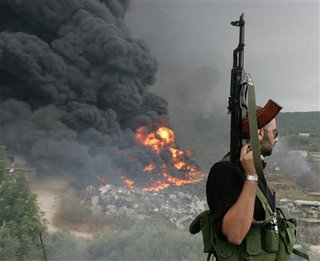 After nearly a week of relentless attack against Lebanon's infrastructure, which has yet to lead to a cessation of hostilities, we might wonder what it is that Jerusalem hopes to accomplish. Already, by embargoing its neighbor, repeatedly attacking its civilian airport, destroying roads, bridges and houses, Israel has demonstrated its disregard for the international laws governing armed conflict. Though some targets, such as the airport, may in fact have been dual-use—meaning that they can have both civilian and military uses—the selection of the overwhelming majority of targets was not supported by the demonstration, prima facie, that the military advantage of destroying them outweighed the impact that this would have on citizens. Moreover, Israel has yet to demonstrate that the targets it has selectively destroyed have in any way weakened Hezbollah's capacity to mount attacks against it.
After nearly a week of relentless attack against Lebanon's infrastructure, which has yet to lead to a cessation of hostilities, we might wonder what it is that Jerusalem hopes to accomplish. Already, by embargoing its neighbor, repeatedly attacking its civilian airport, destroying roads, bridges and houses, Israel has demonstrated its disregard for the international laws governing armed conflict. Though some targets, such as the airport, may in fact have been dual-use—meaning that they can have both civilian and military uses—the selection of the overwhelming majority of targets was not supported by the demonstration, prima facie, that the military advantage of destroying them outweighed the impact that this would have on citizens. Moreover, Israel has yet to demonstrate that the targets it has selectively destroyed have in any way weakened Hezbollah's capacity to mount attacks against it.Unless Israel's gradual destruction of the Lebanese infrastructure is some irrational reaction to Hezbollah's incursion last week—which it is not—we can therefore conclude that them objective is to squeeze Lebanese civilians to such an extent that they will demand that Hezbollah cease to attack Israel, or even disarm. According to Human Rights Watch, however, it is illegal to pressure a population—in effect to conduct terrorism—to influence a military outcome. Furthermore, if this is in fact Israel's objective, it could very well blow in its face, for there are two likelier outcomes to such a tactic.
First, the destruction of civilian institutions and the killing of civilians can go in two directions; it could lead to submission, or—a more likely result—it can fuel rage and force people to rally round the Hezbollah flag or whoever decides to fight back. Rarely in military history has the targeting of a civilian population led to the overthrow of the government (or parallel government) in power. Quite the opposite: for various reasons, including nationalism, it tightens the bonds that unite them and they weather the storm no matter what.
Second, in the unlikely event that Lebanese authorities were to yield to the pressure and confront Hezbollah with the intention of disarming it, Lebanon would risk falling into yet another costly civil war. There is no advantage for Israel in adding a failed state to the neighborhood, where Iran or Syria would be free to step in. Let us remember that in the 1980s partial stability only returned to Lebanon after the Syrian military entered the country. Unless Israel wishes to see a return of Syrian troops within Lebanon (which it does not), it would have to do that, which would thereby further expand its regional colonialism.
Israel undeniably has the military advantage. It has the capacity to wreak havoc on its immediate neighbors. But it is playing with fire, a fire that could very well spread to the entire region.
The other option? U.N. peacekeepers, and soon. But so far, neither Israel or its patron in Washington have demonstrated an interest in that possibility. Absent an interposing force, the cycle of violence will continue, and civilians will remain the disproportionate victims of a risky strategy. So far, less than ten percent of the total dead on either side were military or paramilitary.

1 comment:
Looks nice! Awesome content. Good job guys.
»
Post a Comment